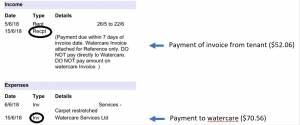1. Why is there a minimum period at the start of a management contract?
We are confident enough in the service we provide to not have an extended ongoing notice period in the event you wish to cancel the management contract, however there is a minimum contract period at the start of the contractual relationship. The purpose of this is to (a) ensure we are appropriately compensated for the extra effort involved in setting up a tenancy, (b) prevent landlords utilising our services simply to find them a new tenant before taking back the management themselves, (c) where a landlord has asked us to manage a property that has been experiencing management difficulties it can sometimes take a period of time and effort to bring things back under control. This gives us time to demonstrate to you that we can professionally manage your property.
2. When do I receive payment?
All rental payments (and water payments) are receipted into the FaceUP Property Management Trust Account and processed daily using Palace Property Management Software. Owner payments are made either once or twice a month as per your preference on the Management Authority. The payment dates are the 1st of the month and the 15th of the month (or the next business day).
Using the Palace software, we compile a full statement for our property owners of the rent collected, less fees and payments incurred by the property. At the end of the financial year we provide a tax year Income and Expenditure summary for your tax returns. You can also view your statements on line through our Owner Portal on our website.
3. How often can the rent be increased?
Under the Residential Tenancies Act rent cannot be increased more than once every 180 days and the Landlord must give the tenant 60 days written notice of this increase. It must also reflect market rent.
4. Who pays the water bill?
With a few exceptions, water is supplied by Watercare. An invoice is sent out monthly. FaceUP receives a copy of your invoice. We pay the invoice for you from your rental income. This ensures an uninterrupted supply of water to the tenants, which is a basic human requirement. If the property is on a metered supply, we will invoice the tenant for their usage. This amount is paid to you at your chosen interval.

It will look like this on your statement:

5. What happens if the tenant doesn’t pay rent?
On the odd occasion a rental payment is missed (and identified on our daily report), an arrears management procedure is initiated.
Day 1
Phone call or text to tenant.
Day 2
Issue a 14 Day Notice
Day 8
Issue a reminder notice.
Day 15
Apply to the Tenancy Tribunal under section (S56) of the RTA after consultation with you, the property owner.
6. How often do you inspect the property?
Inspections take place prior to tenancy commencement and after a tenancy ceases and the tenant moves out.
During the tenancy period, a tenant can expect that the property they rent will be inspected at 13-week intervals (4 times per year). They will usually also have a brief, informal inspection at approximately 6 weeks. Tenants are provided with a written notice of the inspection day approximately 7 days prior. Written notice is sent via email or letter and a text notification is sent to check email.
In the event of an issue being identified at an inspection, follow-up inspections (as required) will be scheduled and carried out. You will receive a written report, outlining any maintenance issues that require attention and your property manager will follow up with a phone call or email.
7. Can I come on periodic inspections?
Of course, you can!!! We hold our tenants to a high standard and we will provide you with a detailed report after each inspection if there are any maintenance issues that should be address. However, sometimes you just want to see it for yourself. We can also provide a video of the property (with the tenants’ prior approval) if you just want a quick look from the comfort of your own home. All properties are placed in a grid of regular inspections, so we can advise you when the next inspection day will be. We have a window of time for doing the inspections, and they are done on a set day but if you let us know what time suits you we can usually arrange that around the schedule.
8. How much notice do I need to give if I simply wish the tenant to leave?
It depends upon the type of tenancy agreement you have.
We generally recommend fixed term tenancies, which means that you are required to wait till the end of the fixed term. Fixed term tenancies can be broken though, but only where the tenant is mutually agreeable and confirms via written consent.
Where it is a periodic tenancy, you are required to give 90 days’ notice to the tenant with the notice period added to the current date that the tenant was informed. In some cases, such as the property being sold or you or a relative moving back in, the tenant can be given 42 days’ notice.
Talk to your dedicated Property manager about your situation, and they will be able to advise you on the correct legal course.
9. Can my tenants leave before the fixed tenancy ends?
Sometimes a major life event occurs, and a tenant may need to end the tenancy early. If you agree to this, we would release them from their fixed term with the proviso that they pay the rent until the home is re-rented and they cover the costs of obtaining the new tenant. In the unlikely event that we are unable to secure a replacement tenant in a reasonable timeframe, without offering a reduced weekly rent, we would expect the vacating tenant to make up the shortfall until the end of their original fixed term.
10. Do I pay for mediation or Tenancy Tribunal proceedings?
There is no charge to you for mediation or Tenancy Tribunal hearings if we have assessed and placed the tenant into the property. However, if the tenant was signed through another agency, or privately, we reserve the right to charge for time and costs for mediation and Tenancy Tribunal activity.
11. Do we require special insurance if we rent our property out?
You need to advise your insurance company that your property is to be rented. Each insurance company may have different requirements and can advise on these.
REAL Landlord Insurance is a cost effect, rental property specific, insurer. They have many levels of insurance based on your specific property needs. Policies are only available through Approved Property Managers who have undertaken our specialised training and met the status required to refer our product. FaceUP is an Approved Referrer, so please talk to us about your needs.
12. What if I decide to sell the house?
FaceUP isn’t just great Property Management, we also have a highly successful Real Estate Sales Division. Having a good relationship with the tenants makes the sales process a lot easier on everybody. Our Property Managers work closely with the sales team to ensure that you get the best service when selling your home with tenants in residence. As a bonus, our commission structure is an everyday low 2% + GST to the first $500,000 and 1.5% + GST on the balance.
A happy and cooperative tenant can help attract other property investors – especially if they want to continue living in the property. A tenanted rental is always a good look for new investors!
If your tenant is on a fixed term tenancy, you must sell that tenancy as part of property sale.
A common, but not necessary, practice is that some property owners will reduce the rent for the tenant during this period where the property is marketed, and viewings undertaken as a sign of good faith.
